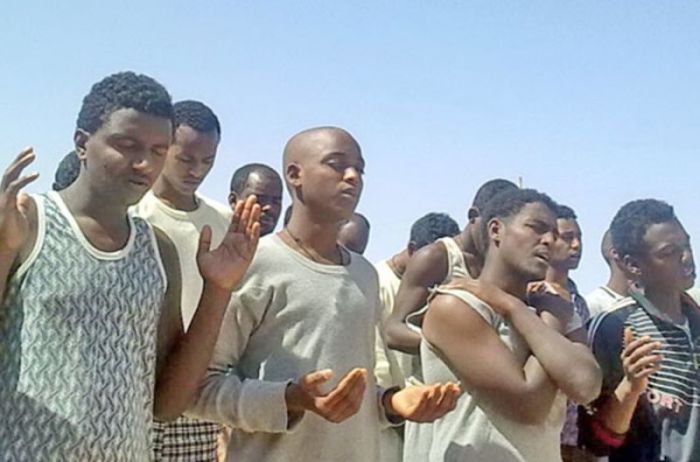Persecuted pastor describes tortures of imprisonment facing Christians in Eritrea

A pastor from Eritrea who has since been resettled to Australia has shed some light on the horrifying conditions facing Christians imprisoned for their faith in the Northeast African country.
The pastor who goes by the name “Gabriel” recalled in an interview with Barnabus Fund how he was tortured, starved and forced to do hard labor during his years in detention in Eritrea.
The United Kingdom-based interdenominational Christian aid agency reports that Gabriel was imprisoned a number of times in Eritrea, which is ranked by Open Doors USA as the seventh-most hostile country in the world when it comes to Christian persecution.
Gabriel’s first stint in prison lasted about a month in 1998. Gabriel was reportedly detained along with other members of his church.
The next time Gabriel was imprisoned, he was jailed for three years even though his sentence was only supposed to last six months.
“Sometimes you dispute with God, why you let me go through this hardship?” Gabriel was quoted as saying. “But when you start reading the Bible, when you pray devotion daily, automatically your mind clicks, you are in the main way – the way you are supposed to go.”
Gabriel’s detention lasted longer than it should have because he was a pastor.
Because he was a Christian leader, he claimed that he was often singled out for beatings in prison.
He recalled one instance in which he was tied up and hit over the head with a stick for an hour as a means to send a message to other prisoners that the Christian faith will not be tolerated.
He also recalled a nurse urging him to recant his Christian faith so that he would no longer receive beatings. The nurse reportedly told Gabriel that he could continue his Christian faith once out of jail. However, he refused to deny Christ.
Gabriel also shared insight into what it was like for him to be locked inside a metal shipping container for two weeks while in solitary confinement.
He said that the temperatures sored inside the container under the heat of the sun during the day and became extreme cold during the nights.
Outside of solitary confinement, Gabriel said that prisoners were only given a small amount of food every 18 hours.
Despite lack of nutrition, the prisoners were forced to do strenuous labor as they had to collect stones to be made into building materials.
“Sometimes you break the stones with a heavy hammer. You hear a sound here, in your back, because everyone has malnutrition,” Gabriel recalled. “The guards discriminated against Christian believers, refusing them medical treatment if they fell sick.”
Gabriel stressed that it was not just him receiving such treatments as other Christians faced similar fates.
He stated that he knew of two prisoners who had converted to Christianity while in prison who were beaten and tortured for three days. Despite the persecution, the new believers did not waver from their new faith in Christ, he contended.
Gabriel added that Bibles were banned in prisons.
If prisoners were found with Christian scripture, they were subject to severe punishment.
However, this threat of punishment did not stop the Christians in prison from reading the word of God.
According to Gabriel, the Christian prisoners divided a Bible up so that each Christian could have a little bit of the Scripture. As for Gabriel, he possessed and was able to teach to other prisoners the book of Revelation.
According to Barnabus Fund, Gabriel fled Eritrea a few years after his release when he learned of government plans to arrest him again.
Earlier this summer, dozens of Eritrean Christians were arrested amid a crackdown against nondenominational Christianity.
As Eritreans are regularly arrested for their religious beliefs and practices while also not being afforded due process under the law, the U.S. State Department recognizes Eritrea as a “country of particular concern” for “systematic, ongoing, [and] egregious violations of religious freedom.”
The Eritrean government has been controlled by President Isaias Afwerki since the country’s independence in 1993. The government only recognizes four religious denominations: Orthodox Christianity, Sunni Islami, the Evangelical Lutheran Church of Eritrea and the Catholic Church.
The government tries to exert control over the recognized religious denominations.
One example is the detention of the rightful patriarch of the Orthodox Church, Abune Antonios, since 2007.
Antonios drew the ire of the regime by refusing to excommunicate thousands of believers who stood against the government. Additionally, Antonios called for the release of political prisoners.
Earlier this summer, the government shut down all Catholic-run health care facilities leaving thousands without access to adequate medical care.
In July, Eritrean Gospel singer Helen Berhane participated in the State Department’s Ministerial to Advance Religious Freedom to be a “voice for those voiceless.” She was also among a group of persecuted believers who visited with President Donald Trump in the White House Oval Office.
She told Trump about how she was kept in a metal shipping container without adequate ventilation for 32 months. Berhane is the author of the book Song of the Nightingale: One Woman's True Story of Faith and Persecution in Eritrea.
Follow Samuel Smith on Twitter: @IamSamSmith
or Facebook: SamuelSmithCP





























